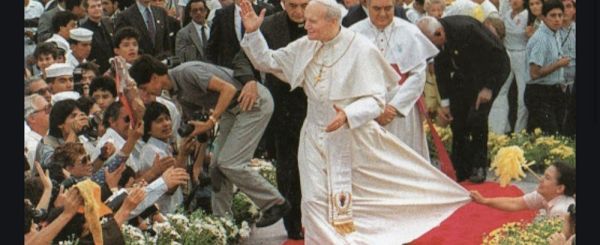2. Let us praise God together with the psalmist: he "is faithful for ever": the God of the covenant. He is the one who "brings justice to the oppressed", who "gives bread to the hungry" - as we ask him every day. God is the one who 'restores sight to the blind': he restores the sight of the spirit. He "raises up the fallen". He "upholds the orphan and the widow" . . . (Ps 146 [145]:6-9).
3. It is precisely the widow who is at the centre of today's liturgy of the Word. This is a well-known figure from the Gospel: the poor widow who threw into the treasury "two pennies, that is, one quintrin" (Mk 12:42) - (what is the approximate value of this coin?). Jesus observed "how the crowd threw coins into the treasury. And many rich people were throwing a lot of them" (Mk 12:41).
Seeing the widow and her offering he said to the disciples: "This widow has thrown more into the treasury than all the others . . . They all gave of their surplus; she, on the other hand, in her poverty, put in all she had, all she had to live on" (Mk 12:43-44).
4. The widow of the Gospel has her parallel in the old covenant. The first reading of the liturgy from the book of Kings, recalls another widow, that of Zarepta, who at the request of the prophet Elijah shared with him all that she had for herself and her son: bread and oil, even though what she had was only enough for the two of them.
And behold - according to Elijah's prediction - the miracle happened: the flour in the jar did not run out and the jar of oil was not emptied . . . and so it was for several days (cf. 1 Kings 17: 14-17).
5. A common characteristic unites both widows - the widow of the old covenant and the widow of the new covenant -. Both are poor and at the same time generous: they give all that is in their power. Everything they possess. Such generosity of heart is a manifestation of total reliance on God. And so today's liturgy rightly links these two figures with the first beatitude of Christ's Sermon on the Mount:
"Blessed are the poor in spirit, for theirs is the kingdom of heaven" (Mt 5:3). The 'poor in spirit' - like that widow of Zarepta in the time of Elijah, and that other in the temple of Jerusalem in the time of Christ - demonstrate in their poverty a great richness of spirit. For: the poor in spirit is rich in spirit. And only he who is rich in spirit can enrich others. Christ teaches that "theirs is the kingdom of heaven".
6. For us who participate in the Eucharistic sacrifice, this instruction is particularly important. Only when our presence here reveals that 'poverty in spirit' of which Christ's beatitude speaks, only then can we offer our offering to the great 'spiritual treasure' of the Church: can we bring this offering to the altar in that spirit which God, our creator, and Christ, our redeemer, expect from us.
The letter to the Hebrews speaks of Christ, the eternal priest, interceding on our behalf by presenting before God the Father the sacrifice of the cross on Golgotha. And this unique, most holy and indefinite value of Christ's sacrifice also embraces the offerings we bring to the altar. It is necessary that these offerings be similar to the offering of that widow in the Jerusalem temple, and also to the offering of the widow of Zarepta from the time of Elijah. It is necessary that these offerings of ours brought to the altar - our participation in the Eucharist - carry within them a sign of Christ's blessedness about the "poor in spirit".
7. The whole Church today meditates on the truth contained in these words of the liturgy. It is given me today, as Bishop of Rome, to meditate on them together with you, the faithful of the parish of St Louis Gonzaga, at Parioli. Your patron, St Louis, lived to the full the evangelical beatitude of poverty in spirit, that is, of stripping oneself of earthly honours and goods in order to conquer true wealth, which is the Kingdom of God. In fact, he said to his father, Marquis of Castiglione delle Stiviere: 'A marquisate is not enough for me, I aim for a kingdom'; he was evidently referring to the Kingdom of Heaven. To realise his wish, Louis renounced his father's title and inheritance to enter the Roman novitiate of the Society of Jesus. He made himself poor in order to become rich. He would later note in one of his writings: 'Even princes are ashes, like the poor'. Just like the 'poor widow', he gave everything to the Lord with generosity and zeal, which has something of the heroic about it. She chose the humblest tasks for herself, dedicating herself to serving the sick, especially during the plague epidemic that struck Rome in 1590, and giving her life for them.
[Pope John Paul II, homily at the parish s. Luigi Gonzaga, 6 November 1988]












